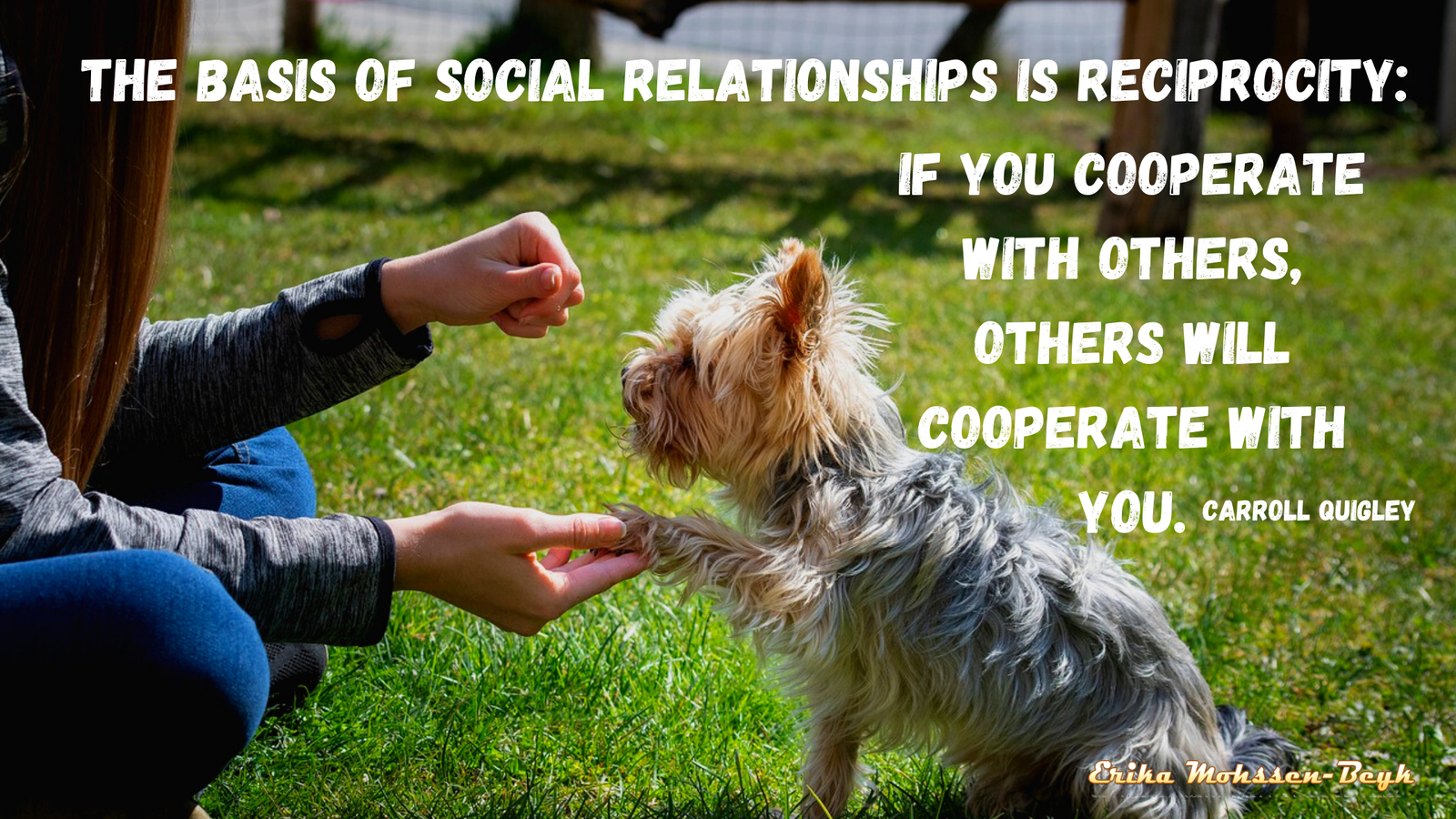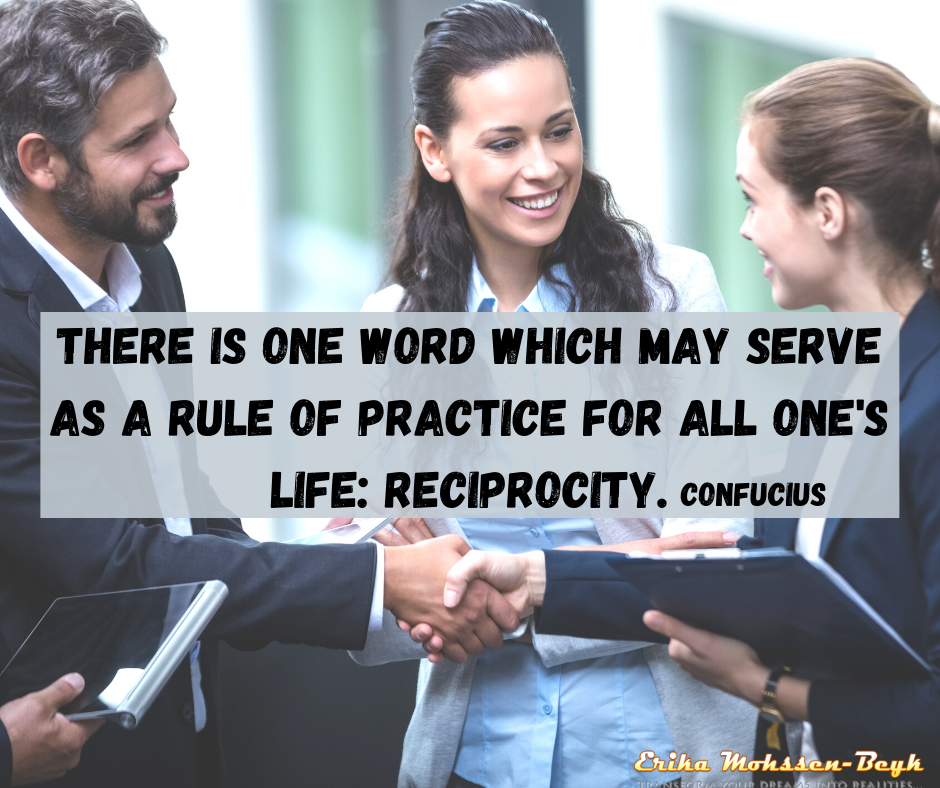Law of Reciprocity and the principle of giving and receiving.
The law of reciprocity accompanies us in all life situations, but we are usually unaware of it.
All life consists of giving and taking. If you accept a service or something material, a debt arises. As a reward, you give something of equal value back. For thousands of years; Human coexistence has been based on this principle. This principle works worldwide and has had a significant impact on the development of humanity. This principle dominates the economy as well as everyday life.
Examples from the past
To better understand reciprocity, it is good looking at the past. The principle of reciprocity already prevailed in early human history. From an evolutionary point of view, this principle was an enormously important need that enabled us to live in groups and guaranteed survival. To help and support each other in the harsh living conditions, people needed to share to ensure the group’s survival. The solidarity of a member of the tribe created benefits for the entire clan. For example, if one:
- Passed on his knowledge.
- Manufactured and distributed tools.
- Looked and provided food.
- Build a shelter.
- Barter is also an example.
The respective tribal member received the recognition of his fellow human beings for his giving. At the same time, the success in survival made it clear that the principle of reciprocity is beneficial for all.
Also, when we pay the debt or volunteer to help someone else, our self-esteem increases and we become more creative.
True community is based upon equality, mutuality, and reciprocity. It affirms the richness of individual diversity as well as the common human ties that bind us together.— Pauli Murray

Reciprocity is a deep instinct; it is the basic currency of social life. — Jonathan Haidt
The basis of reciprocity is to reward like with like. If you help me, I will help you. If you receive a service or material value from a person, you thank him for it. A debt relationship arises. In the economy, you pay off with financial means.
The principle of reciprocity in blogging
Bloggers, for example, use reciprocity. Give and take among bloggers can be very productive. For example, linking from other blogs allows both sides to win new readers, make their blogs better known, and write high-quality content.
But some don’t get anything in return or only have negative experiences with other bloggers. To benefit and create a “win-win” situation, bloggers know the art of and benefit of reciprocity.
Bloggers who comment on a blog and share it on social media and those who receive the comment do the same and give back. It is a good way to connect with other bloggers, get known, and build community.
Accordingly, the principle of giving and taking means that no performance goes unanswered, and both sides benefit.
Reciprocity and Altruism: What is the Difference?
The principle of giving and taking has been a part of our lives since we were children. For example, if children receive a reward from their parents for good behavior, they get love because they offer them attention and care.
Accordingly, reciprocity shapes interpersonal relationships. If you give something without expecting a material or emotional return, this is called altruism.
However, it hardly works in everyday life. If you give unconditionally, there is a risk that others will take advantage of you.
If you ask for something in return, this may also leave a negative impression. For this reason, there should be a balance between reciprocity and altruism.

Giving without taking – does it work?
A too selfless person risks ignoring her own needs, which leads to self-abandonment. It needs rational selfishness to maintain health and prosperity. However, the principle: “Give a little more than you take” is worthwhile.
To help those around you, you don’t have to sacrifice your standard of living. It is enough if you give a little of what you get to those in need.
Many people know: “Only by giving are you able to receive more than you already have.” Jim Rohn
Be generous; it expands your heart.
For example, if we give donations. Small gifts for loved ones also represent giving without the intention of getting something in return. In addition, there are forms of altruism in everyday life. For example, you forego convenience or comfort if you offer your place to older people or the disabled in a queue.
You don’t expect anything for your attention. Here the giving and taking consists in the fact that you receive the happiness of your fellow human beings for your kindness.
Thanks trigger a feeling of well-being in you.
Some people do not seek redress for a favor. That doesn’t mean they’re altruists. They just want a different debt settlement and expect repeated thanks, for example. The feeling of doing a good deed triggers satisfaction and pride in many people. Often they tell people about their actions to get additional recognition. In that case, the principle of giving and taking exists emotionally.
The reciprocity trap
An extreme example is people are trying to take advantage of reciprocity. These people use innate guilt to gain an advantage.
This form of giving and taking is based on the principle: “I only act for something in return.” They often exploit reciprocity. It creates an induced exchange. Corresponding people offer their help, for example, to subsequently request a favor. Because of this behavior, there is a risk of rejection in their environment.
We encounter induced reciprocity, for example, with donation requests. The donation collectors give passers-by flowers or small presents. They then ask for a donation for their organization. Because of the previous gift, those asked feel obliged to make a financial contribution. If they refuse to donate, they fear for their reputation.
Like everything, reciprocity needs the right balance to be beneficial for everyone.
The principle of reciprocity also influences our buying behavior.
Marketers often use the principle of reciprocity to influence people’s buying behavior. They influence potential buyers and sell products of all kinds based on reciprocity.
From a young age, our parents teach us to thank for gifts we have received and show our appreciation for attention. We learn early on that gratitude is an essential part of human coexistence. And we internalize the rule of reciprocity, of “mutuality,” which we then pursue throughout our lives. We also judge people as ungrateful if they don’t show their appreciation.
The rule of reciprocity states that once a person has received something, they feel obliged to give back. This consideration is usually worth more than the original favor.
Some Companies use this same rule, deeply ingrained in each of us, to persuade us to buy their products.
Reciprocity is considered a universal social principle in social science and ethnology. However, some exploit the effect of this principle; there are clever tricks to put people in a buying mood, especially in marketing and advertising. Corporate marketing has long embraced the power of reciprocity through free samples and gifts to encourage customers to buy more.
Giving free samples
We all know some of these strategies used to attract prospective buyers, for example, the product sample. The product sample does not only serve to familiarize potential customers with the advantages of the product on offer. Because the product sample is a gift, the customer feels obligated to reciprocate the gift later by purchasing the product. Here, too, one of the effects associated with the rule can be observed: the benefit returned is worth more than the original favor.
So maybe in the future, we should avoid the advertised product samples before we fill the shopping cart again with products that we don’t need at the end of the day.
On the other hand, these strategies may be the reason why some people don’t trust the “for free” anymore and instead only buy if there is a reasonable price tag.
Reciprocity exploited
Many developed a sense of guilt in childhood and want to give back soon.
The previous examples show that it is easy to use the principle of reciprocity to advantage. It is used every day in marketing. The main motto is: “Friendliness pays off.” Accordingly, service providers strive to be friendly and courteous.
But it would be good to keep in mind that the sense of guilt quickly reaches its limits. If the counterpart feels exploited, it avoids further business or personal contact.
Finding a balance of giving and receiving is not always easy, but it enables a peaceful and pleasant coexistence.
See also The Spirit Of Giving
and How To Live A Successful Life
Download my free e-book > Let The Sunshine In
Change your thoughts brighten your Day, and feel good about yourself
Affirmations and insights to think about and learn to
change our thoughts and perception, which can change our life.
May it help you to have a more positive
outlook 🙂








Thanks for sharing this information. we ensure that other people receive help when they need it and that we receive assistance when we need it. Reciprocity also allows people to get things done that they would not be able to do on their own.
Marcel recently posted…How to Build an Online Salon Appointment Booking Website with ZielCommerce
Right, Marcel
It is also a good feeling if we can help.
Thank you
Erika
Hello Erika, You have touched a really crucial topic. I liked the concept you shared “Give a little more than you take” is Perfect. We are always exchanging energies and is important to balance it well. Also one who gives more also receives more, maybe from unknown sources but Law of Reciprocity always works.
Keep writing such amazing articles.
Regards,
Romil Rambhad
Romil Rambhad recently posted…3 Proven Ways to Develop a Positive Mindset – It works
Hi Romil,
Yes, in our time, not many really think about it. Yes, your concept is right. But we often hear more about “What is in it for me”?
Or the law is used to sell more, as I showed. I think giving and receiving need more attention again. You are right, it is the law written in the Bhagavat Gita to give without expecting back, and it will sometimes come back in miraculous ways. But we have to notice it. It is also an aspect of the law of Karma: It states that we get back- good or bad- whatever thoughts or energy we put out.
Thank you for your comment
Erika
What a simple and powerful idea. Few understand it because they see separation, not One-ness. The wise know that we are all connected as One Spirit. Whatever you give, you receive. Giving and receiving are actually simultaneous in mind but usually, receiving lags giving in form for few are fully clear on getting, aka, receiving. I have loads of fun giving. Now I am training my mind to open to receiving more freely by clearing fears related to shame, worthiness, deserving and embarrassment. So far, so good. Keep up the great blogging work here. Your blog is a treasured mindset resource. I love it and I love your take on life my friend.
Ryan Biddulph recently posted…Why Should You Never Publish a Negative eBook Review as a Blogger?
Yes, this separation is what many learned and grew up with. I always was disturbed by this mine-and-yours talk and often feel I am in the wrong place when people discuss about it 🙂 If I give, I never think of getting back. I like Kahlil Gibran’s poem On Giving:
“See first that you yourself deserve to be a giver and an instrument of giving. For in truth it is life that gives unto life—while you, who deem yourself a giver, are but a witness,” maybe you like it too? https://poets.org/poem/giving-0.
This separation thinking did bring the world where it is today. Good that even science, quantum physics, now comes closer to oneness, only not in the mainstream.
I am glad you like my blog and posts.
Thank you for your comment and encouragement
Erika
Hello Erika Mohssen-Beyk, 2023-02-17
Well written article bringing thoughts of a world who for the most part cannot grasp finality of this material life. I found your name on an article about the plight of the Syrian survivors of the recent earthquake. You commented “Human salvation demands the divine disclosure of truths surpassing reason. -Thomas Aquinas. May the Divine bless you all.”
Thank you for sharing your article and may your blessings bring knowledge and discernment in your journey to help others.
Hello Don,
It is one of my favorite quotes, and it came to my mind for this terrible, disastrous situation all these people are experiencing.
May all be blessed.
Thank you for looking for my blog, your comment and sharing your thoughts. I appreciate it.
Erika